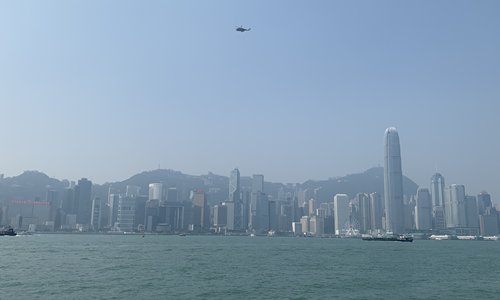HOME >> BUSINESS
HK property moguls urged to shoulder responsibility in easing tensions
By Chen Qingqing, Bai Yunyi and Zhao Juecheng in Hong Kong Source:Global Times Published: 2019/9/29 15:29:44

A view of Hong Kong on September 27 Photo: Chen Qingqing/GT
Following two of the Hong Kong's largest real estate developers joining the city's land resumption project, other Hong Kong property tycoons are being urged to shoulder the responsibility to deal with the city's affordable housing shortages. Business representatives believe that the apparent move will partially ease the housing woes.
On Saturday the city entered the 17th consecutive weekends of protests, and it is commonly viewed that housing shortages remain one of the most critical problems, which had exacerbated public grievances and played no small part in fueling protests on the streets of the city, some local observers said.
Property giant New World Development, one among the Big Four property families, recently announced it would donate three million square feet (270,000 square meters) of farmland to build new homes.
The announcement was soon followed by the decision of Henderson Land Development, another property tycoon, to offer three plots of land under the Hong Kong Special Administrative Region (HKSAR) government's latest land resumption plan.
Hong Kong's "Big Four" families - Li Ka-shing, retired chairman of CK Hutchison Holdings, Cheng Yu-tung of New World Development, Lee Shau-kee of Henderson Land Development, and Kwok Tak-seng of Sun Hung Kai Properties - are also owners of the most prominent property empires.
They have come under the spotlight amid heated social tensions over the widening wealth gap, particularly when developers are often blamed for seizing tremendous profits and driving up home prices.
Raymond Tsoi, the chairman of the Hong Kong Chamber of Professional Property Consultants, termed this move of the two property developers as a "good start."
Both pro-establishment and opposition forces have agreed to tackle housing issues, as they have become much more palpable, and developers that own a large number of plots should work together to help the government resolve the housing woes, Tsoi noted.
"We hope that other property tycoons would follow the move, by offering more lands to build affordable homes for Hong Kong people," he added.
The Hong Kong developers have drawn harsh criticism in mainland media and social media amid rising social tensions that fueled months of anti-government street protests in Hong Kong.
For instance, property tycoon Li Ka-shing was criticized for making housing unaffordable for ordinary people, and for being too tolerant to rioters, as he urged people in power to provide a way out for the younger generation involved in violent protests.
Some Hongkongers also complained about the monopoly of the Big Four families on the Hong Kong housing market, blaming them for contributing to the huge wealth gap.
If each of "Big Four" families offers three million square feet of land, which could help build 6000 square feet of homes, that will be about 150,000 units of public houses, helping to solve the supply-and-demand problem, the chairman said.
However, the entire process of moving from plotted land to ready-to-develop land for housing projects may take five to six years, without other man-made obstacles, business representatives said. Although the HKSAR government had already come up with measures to address the shortage of lands, "some faced backlash from environmental protection groups," Alex Yeung, vice president of Hong Kong Chamber of Professional Property Consultants, told the Global Times.
Meanwhile, some opposition parties also hindered the government's housing reform, which is often seen as part of modus operandi to score political brownie points, according to business representatives.
Former chief executives Tung Chee-hwa and Leung Chun-ying set out certain proposals but it resulted in little success in making housing more affordable.
"It's also highly expected that the HKSAR government would initiate ground-breaking reforms in the 2019 Policy Address, and come up with new policies like a block of HDB flats in Singapore," Tsoi added.